Opening a credit union account involves a few simple steps. First, you need to determine your eligibility. Credit unions often have criteria based on geographic location, employer, or association affiliations. Once you've found a credit union you're eligible to join, you'll need to provide certain documentation like proof of eligibility, identification documents, your Social Security number, and proof of address. After gathering your documents, you'll typically need to fill out an application form either online, in-person, or over the phone. Once approved, you'll be required to make an initial deposit to open your account. The deposit requirements vary among different credit unions. Finally, you'll set up online access and other features to start enjoying the unique benefits of a credit union account. Many credit unions serve individuals in specific geographic areas. It could be a city, a county, or a state. If you live, work, or study within this designated area, you would be eligible to join the credit union. Some credit unions are set up to serve employees of specific companies or industries. If you're employed by one of these companies or in the designated industry, you would qualify for membership. In many credit unions, the family members of current credit union members are also eligible to join. This typically includes parents, siblings, spouses, and children. Belonging to a certain association, club, or organization can also provide eligibility. For example, some credit unions serve members of a religious institution, school alumni, or participants in a non-profit organization. If you're uncertain about whether you're eligible to join a particular credit union, the best course of action is to check with the credit union directly. They can provide you with the specifics about their field of membership. You can also use online tools and resources to find credit unions that you might be eligible to join based on your situation. A key consideration is the range of financial services a credit union offers. This can include basic savings and checking accounts, credit cards, auto and home loans, as well as more advanced services like investment advising. You'll want to choose a credit union that provides the products and services that align with your financial goals and lifestyle. In today's digital age, the ease of access to your credit union matters greatly. Look at the availability and locations of branches and ATMs. Consider whether they offer robust online and mobile banking platforms. It's important that you can access your account and complete transactions conveniently, whether that's in person or online. Credit unions often pride themselves on offering competitive interest rates and lower fees compared to traditional banks due to their not-for-profit nature. Compare rates on savings products and fees on accounts between different credit unions. This can significantly impact your long-term savings and the cost of banking. Lastly, consider the reputation of the credit union. You want to entrust your money to a reliable institution with a strong track record. Look up reviews or ask around about their customer service as well. Excellent customer service can make your banking experience much more pleasant and efficient. Choosing the right credit union involves considering factors like the range of financial services they offer, accessibility, interest rates, fees, and customer service. You'll want a credit union that provides the services you need, whether that's a basic checking or savings account, credit cards, loans, or investment services. The credit union's reputation and the quality of customer service are also essential factors to consider. Once you've chosen a credit union, you'll need to gather the necessary documents. This typically includes identification documents, such as a driver's license or passport, and proof of address. You will also need proof of your eligibility for the credit union, which might include an employee ID or a bill showing your residence in a certain geographic area. Finally, opening a credit union account usually requires an initial deposit. The amount can vary based on the credit union's requirements. It could be a nominal amount or a more substantial sum. Ensure you have the necessary funds ready when opening your account. The first step in the process is to determine if you are eligible to join a credit union. Membership in a credit union is based on commonalities such as employer, geographic location, or family membership. Research credit unions in your area or connected to your employer to find out their specific eligibility requirements. Once you've determined your eligibility, compare different credit unions to find the one that best suits your needs. Consider factors like the range of services offered, accessibility of branches and ATMs, interest rates on loans and savings accounts, and the quality of customer service. Reading reviews and ratings can also provide valuable insights. After choosing a credit union, gather the necessary documents for opening an account. You'll typically need proof of eligibility, a form of identification like a driver's license or passport, your Social Security number, and proof of your current address. With your documents in hand, you can then submit an application to open a credit union account. This process can typically be done online, in person at a branch, or over the phone. You'll need to provide personal details and information about your eligibility. Upon approval of your application, you'll need to make an initial deposit to open your account. The amount required for this deposit varies by credit union, so be sure to check this detail during your research. After your account is officially open, you can set up features like online access, mobile banking, direct deposit, and automatic bill payments. Credit unions often offer a range of digital banking features that can help you manage your money conveniently. The first step to maximizing the benefits of a credit union account is to understand its unique features. Credit unions, as not-for-profit institutions, typically offer higher interest rates on savings accounts and lower interest rates on loans and credit cards compared to traditional banks. They also often have lower fees. Understanding these benefits can help you plan your finances more efficiently. Credit unions often offer a wide range of services, including checking and savings accounts, credit cards, loans, online banking, mobile apps, and more. By utilizing these services, you can manage all your finances in one place, making it easier to keep track of your income and expenses. Using the credit union's online and mobile banking services can also make managing your finances more convenient. One of the significant advantages of credit unions is the higher interest rates they often offer on savings accounts. To maximize this benefit, consider making your credit union your primary institution for savings. The more you save, the more you can earn from these higher interest rates. If you need a loan or credit card, consider getting it from your credit union. Because credit unions typically offer lower interest rates on loans and credit cards, you could save a considerable amount of money in interest payments. Also, credit unions are often more forgiving with lower credit scores, making it easier for members to get approved for loans. As a member-owner of your credit union, you have a voice in its operations. Credit unions are democratic institutions, and members often have the opportunity to vote on important issues, like electing the board of directors. By participating in these activities, you can help shape the direction of your credit union. Opening a credit union account provides numerous financial benefits due to the unique nature of these not-for-profit institutions. This process requires understanding eligibility criteria based on factors such as geographic location, employer affiliation, or family membership. Once you find a suitable credit union, you need to gather necessary documents and meet the initial deposit requirements. As a member, you can take full advantage of higher savings rates and lower loan interest rates compared to traditional banks. By utilizing a wide array of services, including checking and savings accounts, credit cards, loans, and digital banking tools, you can efficiently manage your finances. Additionally, your active participation in the credit union's decision-making process, such as voting in board elections, allows you to influence its direction and operations, contributing to a more personalized banking experience.How to Open a Credit Union Account: Overview
Eligibility Criteria for Opening a Credit Union Account
Geographic Location
Employer Affiliation
Family Membership
Association or Club Membership
Checking Your Eligibility
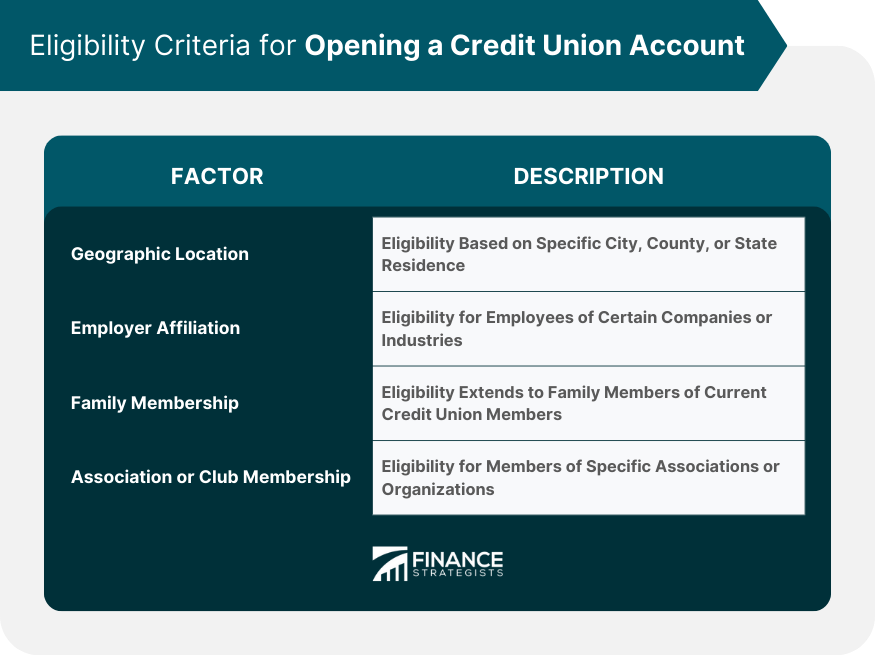
Selecting the Right Credit Union
Range of Financial Services
Accessibility
Interest Rates and Fees
Reputation and Customer Service
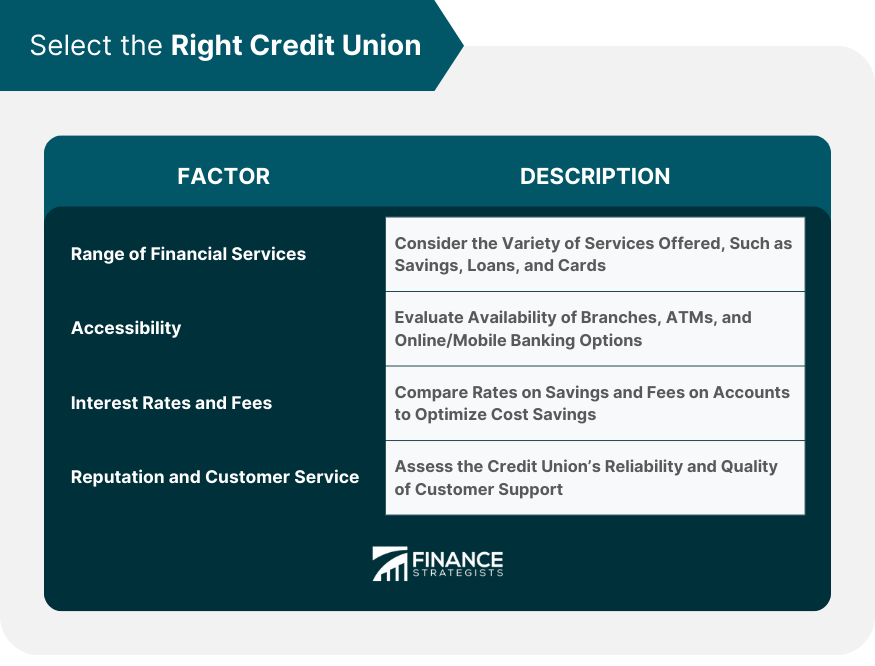
Preparation to Open a Credit Union Account
Select the Right Credit Union
Gather Necessary Documents
Meet Initial Deposit Requirements
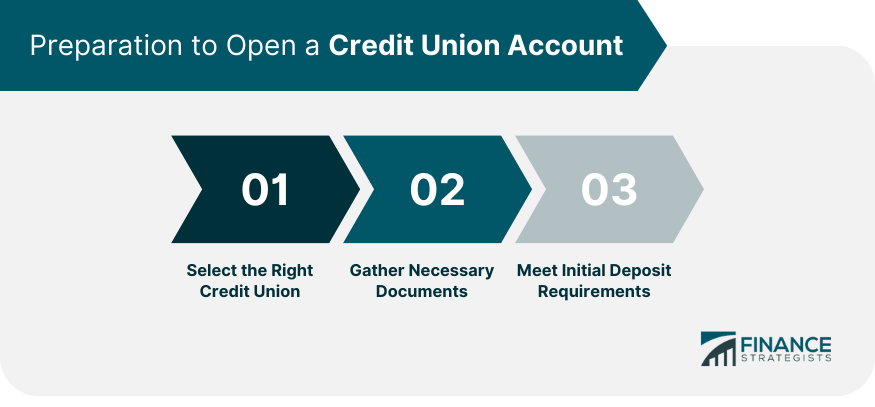
Process of Opening a Credit Union Account
Determine Your Eligibility
Choose the Right Credit Union
Gather Necessary Documents
Submit Your Application
Make an Initial Deposit
Set up Account Features
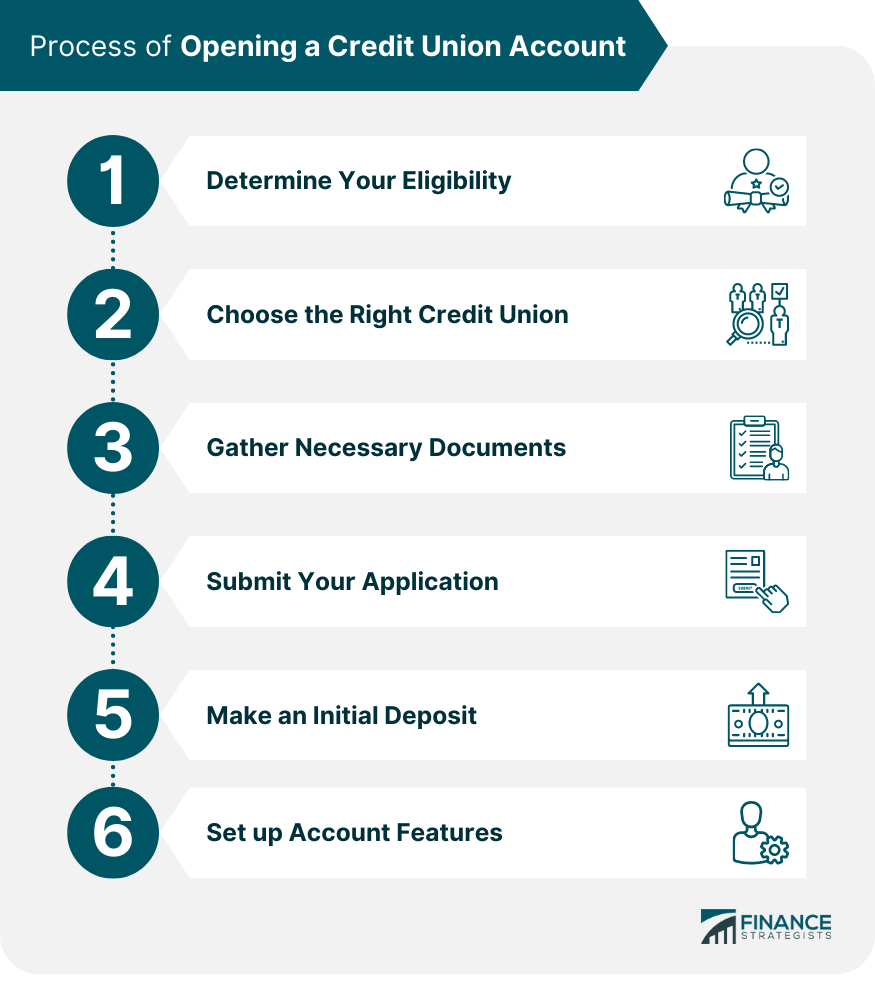
Maximizing the Benefits of a Credit Union Account
Understand the Unique Features
Use All Available Services
Save With Your Credit Union
Borrow From Your Credit Union
Participate in Your Credit Union
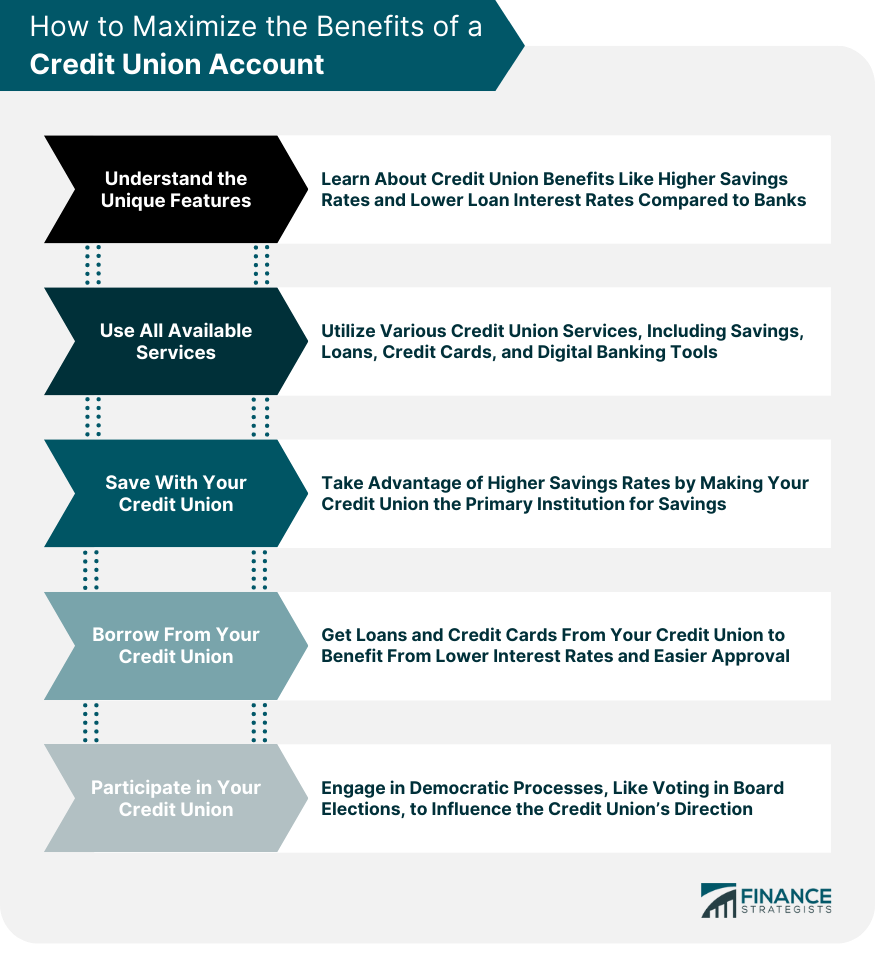
Conclusion
How to Open a Credit Union Account FAQs
A credit union is a not-for-profit financial cooperative, owned and operated by its members. Unlike traditional banks, which are profit-driven and owned by shareholders, credit unions aim to provide their members with better interest rates, lower fees, and a more personalized banking experience.
Eligibility to open a credit union account usually depends on factors such as your geographic location, employer, family membership, or association with certain groups or organizations. Each credit union has its own specific field of membership.
When selecting a credit union, consider factors like the range of financial services offered, accessibility (branch locations, ATMs, online banking services), interest rates, fees, and the credit union's reputation and customer service.
You will need to provide proof of eligibility, identification documents, your Social Security number, and proof of address. You will also need to meet the initial deposit requirements of the credit union.
To maximize the benefits of your credit union account, take full advantage of the services offered by the credit union. This can include savings and checking accounts, loans, credit cards, online banking, and more. Also, remember that credit unions often offer higher savings rates and lower loan rates compared to traditional banks.
True Tamplin is a published author, public speaker, CEO of UpDigital, and founder of Finance Strategists.
True is a Certified Educator in Personal Finance (CEPF®), author of The Handy Financial Ratios Guide, a member of the Society for Advancing Business Editing and Writing, contributes to his financial education site, Finance Strategists, and has spoken to various financial communities such as the CFA Institute, as well as university students like his Alma mater, Biola University, where he received a bachelor of science in business and data analytics.
To learn more about True, visit his personal website or view his author profiles on Amazon, Nasdaq and Forbes.











